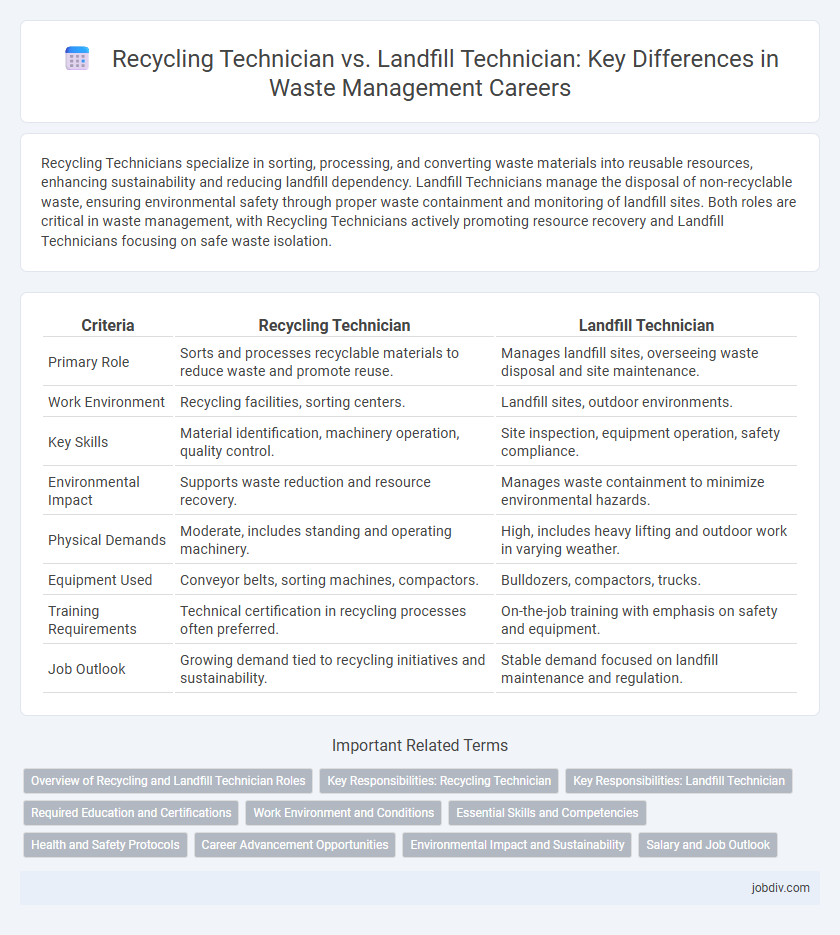Recycling Technicians specialize in sorting, processing, and converting waste materials into reusable resources, enhancing sustainability and reducing landfill dependency. Landfill Technicians manage the disposal of non-recyclable waste, ensuring environmental safety through proper waste containment and monitoring of landfill sites. Both roles are critical in waste management, with Recycling Technicians actively promoting resource recovery and Landfill Technicians focusing on safe waste isolation.
Table of Comparison
| Criteria | Recycling Technician | Landfill Technician |
|---|---|---|
| Primary Role | Sorts and processes recyclable materials to reduce waste and promote reuse. | Manages landfill sites, overseeing waste disposal and site maintenance. |
| Work Environment | Recycling facilities, sorting centers. | Landfill sites, outdoor environments. |
| Key Skills | Material identification, machinery operation, quality control. | Site inspection, equipment operation, safety compliance. |
| Environmental Impact | Supports waste reduction and resource recovery. | Manages waste containment to minimize environmental hazards. |
| Physical Demands | Moderate, includes standing and operating machinery. | High, includes heavy lifting and outdoor work in varying weather. |
| Equipment Used | Conveyor belts, sorting machines, compactors. | Bulldozers, compactors, trucks. |
| Training Requirements | Technical certification in recycling processes often preferred. | On-the-job training with emphasis on safety and equipment. |
| Job Outlook | Growing demand tied to recycling initiatives and sustainability. | Stable demand focused on landfill maintenance and regulation. |
Overview of Recycling and Landfill Technician Roles
Recycling Technicians specialize in sorting, processing, and managing recyclable materials to reduce environmental impact and promote resource recovery. Landfill Technicians focus on operating and maintaining landfill sites, ensuring proper waste disposal, environmental compliance, and site safety. Both roles require knowledge of waste management regulations but differ in their approach to handling waste materials and environmental sustainability.
Key Responsibilities: Recycling Technician
Recycling Technicians are responsible for sorting, processing, and preparing recyclable materials to ensure efficient recovery and reuse, which reduces landfill waste and conserves natural resources. They operate machinery, inspect materials for contaminants, and maintain equipment to optimize recycling processes. Their role also includes educating the public or workers about best practices in recycling to enhance material quality and environmental impact.
Key Responsibilities: Landfill Technician
Landfill Technicians manage daily landfill operations, ensuring proper waste disposal and environmental compliance through monitoring leachate systems and gas extraction processes. They conduct soil sampling, maintain equipment, and enforce safety protocols to prevent contamination and health risks. Their role is critical in landfill site maintenance, regulatory reporting, and waste volume tracking.
Required Education and Certifications
Recycling Technicians typically require a high school diploma or equivalent, with additional certifications in waste management, environmental safety, or hazardous materials handling enhancing job prospects. Landfill Technicians often need similar foundational education but may require specialized training or certifications in landfill operations, environmental regulations, and heavy equipment handling. Both roles benefit from OSHA safety certifications and state-specific waste management licenses to ensure compliance with environmental standards.
Work Environment and Conditions
Recycling Technicians typically work in sorting facilities or recycling plants where they handle materials in controlled, indoor environments with moderate exposure to noise and dust. Landfill Technicians operate outdoors at landfill sites, confronting variable weather conditions, heavy machinery, and potential exposure to odors and environmental hazards. Both roles require adherence to safety protocols, but Landfill Technicians face more physically demanding and less regulated environmental settings.
Essential Skills and Competencies
Recycling Technicians require expertise in material identification, sorting technology, and environmental regulations to efficiently process recyclable waste streams and maximize resource recovery. Landfill Technicians must possess skills in site monitoring, contamination control, and equipment operation to manage waste disposal safely while ensuring compliance with environmental standards. Both roles demand strong problem-solving abilities and knowledge of waste management systems but differ in their focus on resource recovery versus waste containment.
Health and Safety Protocols
Recycling Technicians adhere to stringent health and safety protocols by using protective gear to handle hazardous materials and operating machinery designed to minimize injury risk, significantly reducing exposure to harmful substances. Landfill Technicians follow rigorous safety measures such as airborne contaminant monitoring and heavy equipment operation training to manage toxic gases and physical hazards in waste disposal sites. Both roles require compliance with OSHA standards to ensure workplace safety and prevent accidents, but Recycling Technicians often face higher risks from chemical exposure, whereas Landfill Technicians encounter more environmental and mechanical dangers.
Career Advancement Opportunities
Recycling Technicians often have broader career advancement opportunities due to the growing demand for sustainable waste management and the integration of new technologies like automated sorting systems and material recovery. Landfill Technicians typically focus on site management and environmental compliance, with promotion potential tied to regulatory expertise and operational oversight in land disposal. Both careers benefit from certifications and specialized training, but Recycling Technicians may advance more rapidly in roles related to sustainability programs and circular economy initiatives.
Environmental Impact and Sustainability
Recycling Technicians play a crucial role in reducing environmental impact by sorting and processing recyclable materials, which decreases the volume of waste sent to landfills and conserves natural resources. In contrast, Landfill Technicians manage waste disposal sites where decomposition can release methane, a potent greenhouse gas contributing to climate change. Prioritizing recycling enhances sustainability by minimizing pollution, reducing landfill dependency, and promoting circular economy principles.
Salary and Job Outlook
Recycling Technicians earn an average salary of $40,000 to $55,000 annually, with job growth projected at 5% over the next decade due to increasing environmental regulations and demand for sustainable waste management. Landfill Technicians typically make between $38,000 and $52,000 per year, but face slower employment growth around 2% as automation and waste reduction strategies reduce landfill dependency. Both roles require specialized skills in waste handling, but Recycling Technicians benefit from a stronger job outlook driven by expanding recycling programs and green initiatives.
Recycling Technician vs Landfill Technician Infographic

 jobdiv.com
jobdiv.com